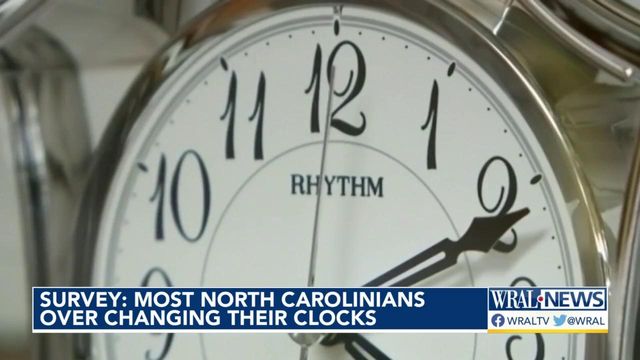Poll: 2 in 3 North Carolinians want to end time change
This is the weekend most of America sets its clocks back by one hour. If you hate doing this, you’re definitely not the only one. A new poll shows two-thirds of North Carolinians are right there with you.
High Point University asked 1,000 adults in North Carolina in October their opinions on the twice-a-year time change. By a 2-1 margin, people said they'd prefer to stop doing it entirely. 67% percent of respondents said they’re tired of changing their clocks. Just 25% said they prefer the current system. 9% were unsure.
They also asked respondents this question: If we were to pick a time and stick with it, which one should we choose?
Daylight Saving Time keeps it lighter later in the evening, but it’s darker in the morning. That’s Fecilia Scott’s choice.
"It would be good if we could have a little down time," Scott told WRAL News. "You know, wind down a little bit and then get rest, versus going to straight to bed."
The other option, Standard Time—the one we’re about to switch to—means an earlier sunrise, but earlier darkness, too. That’s what Charman Driver would prefer.
"I’d personally like more light in the morning. I like to get up early and exercise and walk my dogs," Driver said, calling the semiannual time change "antiquated."
In the poll, Daylight Saving Time was the clear winner. Some 46% of all respondents said they’d like to keep DST, while 21% said they’d prefer Standard Time.
America has been changing its clocks twice a year for more than a century now. High Point University Business School Dean Daniel Hall says Daylight Saving Time started in the U.S. in 1918 during World War I as a way to conserve energy for the war effort.
But our economy today is very different than it was 1918, and the changing time twice year comes at a cost of lower productivity and negative physical and mental health effects.
"Most studies have shown that there isn't really any significant energy savings," Hall said. "I don't think it passes a cost/benefit analysis anymore. But like, a lot of regulations, once they're enacted, they're hard to undo."
A federal law – the Uniform Time Act of 1966 – keeps states from opting out of the time change. But many would like to, especially in the southeastern U.S., where several states have passed laws making Daylight Saving Time permanent if Congress changes the law to allow it.
In May, the North Carolina House passed a similar bill. Sponsor Rep Jason Saine, R-Lincoln, has filed this bill every session for years.
"It's something I've been passionate about all my life because of the way that time change just messes up my whole internal clock," Saine said.
Saine told WRAL News he hears about it frequently from constituents, too.
"I just got a text from a friend just a couple hours ago, saying, 'Please do something about this. I know you're working on it, but it makes my life miserable,'" Saine said. "There's this week-long run-up of dread, knowing that this is going to happen this weekend."
There may be some hope for the haters. Last year, the U.S. Senate unanimously passed a bill making Daylight Saving Time permanent. The U.S. House didn't take it up. But the bill was filed again this year, and Saine says momentum is growing.
"It would change people's lives," Saine said.











